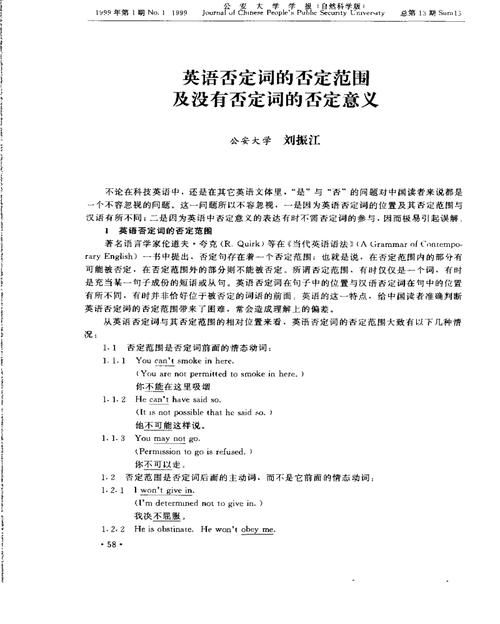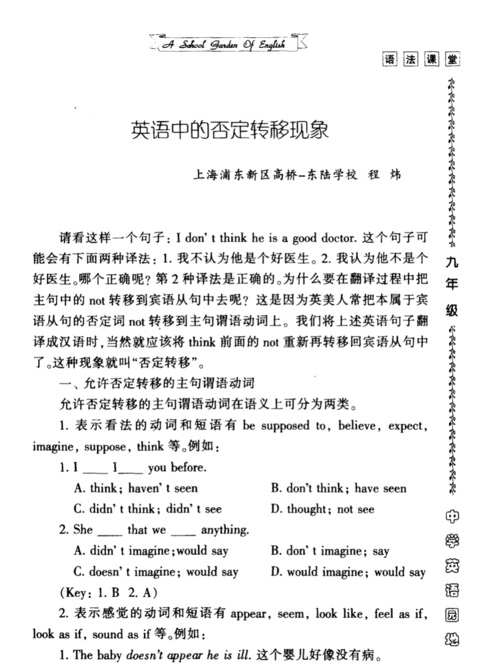本文目录
英语中部分否定的几种表示方法
英语中的部分否定(即不完全否定),接下来,我给大家准备了英语否定的几种表示 方法 ,欢迎大家参考与借鉴。
英语否定的几种表示方法
一、 all 的否定式:not all…(或:all…not)表示"并非都……"、"不是所有的都……"例如:
Not all men can be masters. (= All men cannot be masters.) 并非人人都能当头头。
Not all bamboo grows tall. 并非所有的竹子都会长得很高。
二、 both 的否定式:not…both (或:both… not) "并非两个……都……" 例如:
I don't want both the books. 我不是两本书都要。
Both (the) windows are not open. 两扇窗子并不都开着。
三、 every…的否定式:"不是每……都……" 例如:
Not every book is educative. (或:Every book is not educative.) 不是每本书都有 教育 意义的。
Not everyone likes this book. 并非人人都喜欢这本书。
This flower is not seen everywhere. 这花并不是随处可见的。
四、 always的否定式:"并非总是(并非一直)……" 例如:
He is not always so sad. 他并不是一直都这样悲伤。
五、 entirely1, altogether, completely2 和quite 的否定式:"不完全……","并非完全……" 例如:
The businessman is never to be entirely trusted. 不可以完全信任商人。
He felt not altogether satisfied3. 他并不完全满意。
I don't agree completely. 我并不完全同意。
What he did was not quite proper. 他做的不十分妥当。
六、 all the time 的否定式:"并非一直……"、"未必老是……" 例如:
A foolish man doesn't make a mistake all the time. 笨人未必老是犯错误。
七、 not…and…的否定式,被否定的往往是and后面的那一部分。 例如:
He did not speak clearly and correctly. 他讲得清楚但不正确。
This film is not interesting and instructive. 这部电影有趣但无教育意义。
She cannot sing and dance. 她会 唱歌 但不会跳舞。
如果将and 换成or,not 对其后面的两部分就全盘否定了。
He did not speak clearly or correctly. 他讲的既不清楚也不正确。
如要对上述的all, both, every, always, 以及entirely, altogether, completely, quite 和 all the time 等词作完全否定,那就分别要用与之相对应的全否定词,如no, none, neither, no one, never, not (never)… at all 等。例如:
All of them can do it.--- None of them can do it.
Both are good.---Neither is good.
Everybody likes it. ---Nobody likes it.
He is always late. --- He is never late.
We don't trust them entirely. --- We never trust them at all.
He was here all the time. --- He was never here.
扩展:英语的否定转移
在学英语的过程中,学生常将这样的 句子 "我认为这不是个好主意." 译为"I think it isn't a good idea." 而将这句英语译成汉语时,学生又会译为 "我不认为这是个好主意." 老师又会说译错了,这不符合 "I don't think..." 句型,应译为 "l don't think it's a good idea."
那么,这错误的根源究竟在哪里?这就是“英语的否定转移”在作怪。否定转移在非正式语体中特别常见,它是将语义上属于从属分句(一般为that clause1)的否定词转移到母句中去。允许否定转移的母句动词在语义上可分为以下两组:
1.看法(OPINION):anticipate,be supposed to,believe,calculate, expect,figure (infml,AmE),imagine, reckon2 (infml,esp, in AmE),suppose,think:
Eg. I don't believe I've met you before.
("I believe I haven't met you before.")
Eg. She didn't imagine that we would say anything.
("She imagined we wouldn't say anything.")
Eg. He didn't expect to win.
("He expected not to win.")
2.感觉(PERCEPTION) appear,seem,feel as if,look as if,sound as if (后三个动词也作infml,esp, in AmE,其中用like来代替as if):
Eg. It doesn't seem that we canget our money back.
"It seems that we can't get our money back."
Eg. The baby doesn't appear to be awake.
("The baby appears not to be awake.")
Eg. It doesn't look like it's going to rain.
("It looks like it isn't going to rain.")
否定的转移是一种含糊的现象。对于否定词位置不同的两个句子,意思是否相同,或者在多大程度上相同的问题,各人的直觉可能是不同的。但在以下特殊情况下,原来允许否定转移的动词不能将否定转移:
1.I think是插入句,可看作与其他部分无关:
I wish you were here,then I think I should not feel like this.
2.母句中添加情态动词can't mustn't wouldn't时:
I can't believe that they are married.
You mustn't think he's stupid.
I wouldn't have imagined that Sandra would be here.
3.由于cannot help doing,ought not,need not,not at all等 短语 的关系而把I think隔离。
I should have thought sometimes you couldn't help thinking of the past.
I think you ought not to walk at night alone,Mrs. Moore.
I think you need not be impolite3 to her,as well as to her son.
"I think the angel4 are not at all in heaven." Mr.Esmond said."
4. 由于not just... but, just not... enough,not much, not quite等以not为核心的副词短语的影响,也不便把否定拿到动词的前面去:
I think I'm just not smart enough to make any sense out of for you.
"You think she's not much like you? Brerald asked.
But I think that Elizabeth was not quite so certain of it as I.
句中含有no, never, nothing, nobody等的不定词时:
I should think you never have seen many.
I thought it explained nothing.
相关 文章 :
1. 中考英语语法专题详解六:动词
2. 初中英语语法基本句型秘诀
3. 中考英语语法考点:句子结构
4. 中考英语语法选择题的技巧和23个例题考点
5. 人教版初中英语语法大全
6. 中考英语语法填空答题技巧

英语中发生否定转移的词有哪些
初中英语语法对否定转移的用法及总结
下文是老师为同学们带来关于在什么情况下会使用到否定转移,希望可以帮助到大家。

否定转移
1) 将think, believe, suppose, expect, fancy, imagine等动词 后面宾语从句的否定词转移到主句中,即主句的谓语动词用否定式,而从句的谓语动词用肯定式。
I don't think I know you. 我想我并不认识你。
I don' t believe he will come. 我相信他不回来。
注意:若谓语动词为hope,宾语从句中的否定词不能转移。
I hope you weren't ill. 我想你没有生病吧。
2) 将seem, appear 等后的从句的否定转移到前面。
It doesn't seem that they know where to go.
看来他们不知道往哪去。
It doesn't appear that we'll have a sunny day tomorrow.
看来我们明天不会碰上好天气。
3) 有时将动名词,介词短语或整个从句的否定转变为对谓语动词的否定。
I don't remember having ever seen such a man.
我记得从未见过这样一个人。 (not否定动名词短语 having…)
It's not a place where anyone would expect to see strange characters on the street.
在这里,人们不会想到在街上会碰上陌生的人。
(anyone 作主语,从句中的谓语动词不能用否定形式。)
4) 有时状语或状语从句中否定可以转移到谓语动词前。
The ant is not gathering this for itself alone. (否定状语) 蚂蚁不只是为自己采食。
He was not ready to believe something just because Aristotle said so. (否定because状语) 他并不因亚里斯多德说过如何如何,就轻信此事。
She had not been married many weeks when that man's younger brother saw her and was struck by her beauty. (否定状语many weeks) 她结婚还不到几个月,这个人的弟弟就看见她了,并对她的美貌着了迷。
同学们可以适当的用例句来理解,这样比较方便记忆而且记得也会比较牢固!
初中英语语法大全:动词的种类
关于英语中动词的种类知识,希望同学们很好的掌握下面的内容学习。
动词的种类
动词是表示动作或状态的.词,按其词义和在句子中的作用可分为行为动词,连系动词,助动词和情态动词。
1.行为动词
行为动词可分为及物动词 (vt)和不及物动词(vi),及物动词表示动作或状态,有完整的词义,能单独作谓语,后跟宾语;不及物动词表示动作或状态,有完整的词义,能单独作谓语,但后面不能直接跟宾语,如要带宾语则与介词或副词构成短语。
如:
More and more people study English.(vt)
The students are listening to the teacher carefully.(vi)
2.连系动词
连系动词本身有一定的词义,但不能独立作谓语,必须与表语一起构成谓语。常用的连系动词有 be, get, turn, become, look, feel, grow, seem, sound, taste, smell等。
如:
Our country is becoming stronger and stronger.
It feels damp.
3.助动词
助动词本身无词义,不能单独作谓语,只能和主要动词一起构成谓语动词,表示否定,疑问及动词的时态、语态、人称和数等语法特征,助动词有 be,do,have,shall,will等。
如:
How do you usually come to school?
The children are playing yo-yo now.
4.情态动词
情态动词本身有一定的意义,但不能独立作谓语,只能和主要动词原形一起构成谓语,表示说话人的语气和情态。情态动词没有人称和数的变化。情态动词有 can (could),may(might),must, need, ought to, dare等。
如:
Can I help you?
- Must we go now? -No, you needn't .
a. can与be able to的用法有所区别。can只用于一般现在时和过去时,指本身有能力的"能";be able to用于各种时态均可,指须经过努力而"能"。
b. must与have/has to的用法。must表示说话人主观认为"必须",只用于一般现在时和一般将来时;have/has to表示客观需要,意为"不得不",它可用于各种时态。
c.need和dare既可作情态动词也可作行为动词。
以上对动词的种类知识的内容讲解学习,相信同学们已经能很好的掌握了吧,希望同学们在考试中取得很好的成绩。
初中英语语法大全:动词不定式的形式
对于英语的学习中,关于动词不定式的形式知识点的内容,我们做下面的讲解学习哦。
动词不定式的形式
1.作主语。 如:
To learn English is very important.
但实际上不定式作主语常用 it来作形式主语,而将不定式移至谓语动词后作真正的主语。
如上句可表达为:
It's very important to learn English.
2.作表语。 如:
My idea is to ring him up at once.
3.作宾语。 如:
I have decided to go to Binjiang Primary School.
4.作宾语补足语。
a. ask, want, teach, tell, know, would like, allow等动词后面接动词不定式作宾语补足语。
如: The policemen asked him to get off the bus.
b. hear, see, look at, feel, watch, notice, listen to等动词后接不带to的动词不定式作宾语补足语。
如: We often see Miss Li clean the classroom.
c. let, make, have这些使役动词后接不带to的动词不定式作宾语补足语。但在被动语态中这些不带to的都须带上to。
如: In those days the bosses often made the workers work day and night.
d.动词help接动词不定式作宾语补足语,可带to也可不带to。
如: Can you help me (to) carry the heavy bag?
5.作定语。
a.与被修饰词有动宾关系。如:I have something important to tell you.但如果不定式动词为不及物动词,后面的介词千万不要省略。
如: Maybe they have three rooms to live in.
b.与被修饰词有主谓关系。
如: Mr Liang is always the first to come and the last to leave.
c.与被修饰之间只有修饰关系。
如: I have no time to play cards.
6.作状语,表示目的、原因、方法、方向、结果等。
如: I'll go to meet my friend at the railway station.
7.不定式复合结构"for sb. to do sth" 作主语时,常用"It is +adj+ for
of sb. to do sth"的句式。形容词good, bad, polite, unkind, kind, ice, clever,
right, wrong, careful等用"It is +adj +of sb. to do sth."
其他形容词用 for。
如:
It's dangerous for you to ride so fast.
It's very kind of you to help me.
8.动词不定式与疑问句who, what, which, when, how, where, whether等连用。
如: I don't know when to start.
He didn't tell me where to go.
但上面结构相当于一个从句,故上述句子也可表达为:
I don't know when we'll start.
He didn't tell me where he would go.
注意:
a.有些动词或动词短语不能带不定式,只能接动词的-ing形式。
如: enjoy, finish, keep, mind, miss(错过),be busy, go on, keep on, be worth, practise等。
如: The peasants are busy picking apples.
Would you mind my opening the door?
b.有些动词后可接不定式,也可接动词的-ing形式,但意思不同。
如: Lu Jian forgot to post the letter.(该寄但还没做)
Lu Jian forgot posting the letter.(已经寄过信了)
They stopped to sing a song.(停止在做的工作而去做另一件工作)
They stopped singing.(停止正在做的工作)
希望上面对动词不定式的形式知识的内容讲解学习,同学们都能很好的掌握,相信同学们会取得很好的成绩的哦。
初中英语语法大全:短语动词的四种类型
同学们认真学习,下面是老师对短语动词的四种类型知识总结。
短语动词的四种类型
动词与介词、副词等构成的固定短语,叫短语动词。主要有四类:
一、动词+副词
有的一般不跟宾语,如go ahead, fall behind, get up, lie down, go up, run out, give in, stay up等;有的可以跟宾语,如put out, carry out, give up, wake up, check in, eat up, fill in, find out, fix up, hand in, mix up, look up, make out, turn down, work out等。
注意:宾语是名词时,放在副词前面或后面都可以,但若作宾语的是人称代词时,就只能放在动词和副词之间了。如:
We’ve decided to put the meeting off (=put off the meeting) . 我们决定把会议推迟。
We’ve decided to put it off. 我们决定将它推迟。(不说put off it)
二、动词+介词
如ask for, care for, call for, break into, deal with, call on, look for等。后面必须接宾语。如:
I don’t care for tea. 我不喜欢喝茶。
三、动词+副词+介词
如look forward to, put up with, looked up to, go in for, go along with, date back to, look down on, keep up with, add up to, run out of等。如:
She soon caught up with us. 她很快赶上了我们。
四、动词+名词+介词
如take care of, pay attention to, make use of, make contribution to做出贡献等。如:
Take care of your brother while I am away. 我不在的时候,你要照顾好你弟弟。
希望上面老师对短语动词的四种类型知识的讲解学习,同学们都能很好的掌握,相信同学们会学习的很好的哦。
初中英语语法大全:及物动词与不及物动词
关于英语中及物动词与不及物动词的知识学习,我们做下面的内容讲解。
及物动词与不及物动词
根据其后是否带宾语,动词可分为及物动词(带宾语)和不及物动词(不带宾语)。如:
When will he arrive? 他什么时候到?(arrive 不带宾语,为不及物动词)
He reached Beijing yesterday. 他昨天到达北京。(reach 带了宾语,为及物动词)
有的动词既可用作及物动词也可用作不及物动词:
The child is playing. 这小孩在玩。(不及物用法)
The child is playing the piano. 这小孩在弹钢琴。(及物用法)
He is writing. 他在写字。(不及物用法)
He is writing a letter. 他在写信。(及物用法)
The boy is reading. 这男孩在阅读。 (不及物用法)
The boy is reading a magazine. 这男孩在看杂志。(及物用法)
上面对及物动词与不及物动词知识的内容讲解学习,希望给同学们的学习很好的帮助,相信同学们会学习的更好的吧。
初中英语语法大全:实义动词与非实义动词
下面是对英语中实义动词与非实义动词知识的内容讲解,希望同学们很好的掌握。
实义动词与非实义动词
根据其含义和句子功用,动词可分为实义动词和非实义动词(包括时态助动词和情态助动词等)。如:
He bought a story book. 他买了一本故事书。(buy 为实义动词)
He has read the story book. 他已读过这本故事书。(has 为时态助动词,read为实意动词)
He should read the story book. 他应该读读这本故事书。(should 为情态助动词,red为实义动词)
上面对实义动词与非实义动词知识的内容讲解学习,相信同学们已经能很好的掌握了吧,希望同学们考试成功。
;英语中的否定转移
否定转移
否定的转移是指英语否定句在句中某一部分(常在谓语部分),但在语义上却是否定另一部分的现象。翻译这类句子时不要单纯依赖语法分析,而应从语义上分析,根据上下文理解句意。例:
He doesn’tteach because teaching is easy for him. 他之所以教书,并不是因为他觉得教书轻松。
一、否定形式在表示“看法”的谓语动词上,语义上却是否定后面的宾语从句。
此类动词有:think, believe, suppose, imagine, expect, anticipate, fancy, consider,find (感到), guess,
be supposed to, calculate, figure, reckon。
- I don't believe I've met you before. ("I believe I haven’t metyoubefore.") 我认为我没有见过你。
- I don't think you will be late. 我认为你不会迟到。
- I don't suppose he cares, does he? 我看他不在乎,对吧?
- He doesn't expect we need worry. 他认为我们不必着急。
- I don’t recon she is old enough to go toschool. 我认为她还没到上学的年纪。
注:上述判断性动词出现以下情况时,其否定不发生转移:
(1)用作插入语时:
-Li Lei, I think, won’t be angry with you. 我想李蕾不会生你的气。
-Tom, I suppose, won’t be against it. 我猜想汤姆不会反对。
(2)这些动词跟其他另一个动词一起做并列谓语时:
- Ibelieve and hope he won’t do that. 我相信并且也希望他将不会那样做。
(3)用于疑问句时:
-Do you think it is not going to rain? 你认为天不会下雨吗?
(4)主句中添加情态动词can't, mustn't, wouldn't时:
- You mustn’tthink he’s stupid. 你不应该认为他愚蠢。
- I wouldn'thave imagined that you would be here. 我不曾想到你会在这儿。
- I can’t imagine how he could survive that car accident. 我想象不出在那次车祸中他是怎样活命的。
(5)think , expect 作料想讲时:
- I didn’t expect I’d meet you here. 我没料到会在这里碰上你。
- We didn’t think he is such a selfish man. 我们没料到他是这样一个自私的人。
(6)suppose , think 用于祈使句式或被副词修饰时:
- Don’t suppose you have passed the exam, this is only a partof the exam.
别以为你通过了考试,这仅仅是考试的一部分。
- I simply don’t think you will give me a hand when I’m indifficulty.
我根本不指望你在我困难的时候能帮助我。
- Ireally don’t think it’s necessary for us to go there now. 我的确不认为我们有必要去那儿。
- Ifeel strongly that he shouldn’t do such a thing. 我强烈地认为他不应该做那样的事。
(7)上述动词所接的宾语从句中如有all , every, many , both 等表全体意义的词或副词时:
- I don’t believe both of them are innocent. 我不相信他们两个都是清白的。
- I never expect all the students will do the exercises afterclasses.
我从不抱希望于所有学生都会在课外做作业。
- We don’t consider everybody in our class is interested inthis topic.
我们并不认为班里的每个人都对这个话题感兴趣。
(8)由于cannot help, ought not, need not, not at all等短语的关系而把I think 隔离:
- I shouldhave thought sometimes you couldn’t helpthinking of the past. 我应该想到你会禁不住想起过去。
- I think youought not to walk at night alone,Mrs. Moore.
- I think youneed not be impolite to her,as well as to her son.
- "Ithink the angel are not at all inheaven." Mr.Esmond said."
二、否定形式在表示“感觉”的谓语动词上,语义上却否定表语部分。
此类动词有:appear, seem, feel, sound, taste, smell, as if,feel / look / sound as if, feel /look like。
- The old streets don’t appear deserted. ( not deserted . ) 老街看样子还没被废弃。
- I’m not feeling very well today. My head aches. ( not verywell … ) 我今天感到不怎么舒服,头痛。
- The food doesn’t taste fresh. ( not fresh . ) 食物偿起来不鲜。
- It doesn’t seem that they know where to go. 看来他们不知道往哪去。
- It doesn’t appear that we’ll have a sunny day tomorrow. 看来我们明天不会碰上好天气。
三、seem, prove, happen 与不定式构成复合谓语,形式上否定谓语,语义上否定不定式。
- The president didn’t happen to attend that meeting. (happen not to attend … )
董事长碰巧没参加那次会议。
- Your answer doesn’t seem to be right. (seem not to be …) 你的答案看起来似乎不正确。
- Jack doens't seem to like you.(=Jack seems not to like you.)杰克看来不喜欢你。
- The news didn't seem to be true. 这个消息好象并不是真的。
四、pretend , remember 的宾语为非谓语动词时,形式上否定谓语,语义上否定宾语。
- My Italian friend didn’t pretend to see her tutor inthe dining room. (pretend not tosee … )
我的意大利朋友在餐厅里假装没看见她导师。
- I couldn’t remember having carried my wallet out. (否定having …) 我记得不曾带钱包出门。
五、形式上否定谓语,语义上否定宾语补足语。
- I neverknew him to carry money because he never had any use of it.
我知道他身上从不带钱,因为他从不需要钱。
- We do not consider melting or boiling to be chemical change. (not to be … )
我们认为熔化和沸腾不是化学反应。
- Seeing a ball flying, we don’t expect the ball to flyforever. (not to fly …)
看到球飞时,我们认为它不会永远飞下去。
- Idon’t think math difficult. 我认为数学不难。
- Idon’t find the story interesting. 我认为这个故事没有趣。
- Idon’t expect so. 我认为不会。
六、在“It is / was likely / probably + 从句”中,形式上否定谓语,语义上否定从句。
- It isn't likely that it will rain tomorrow. 看起来明天不会下雨。
- It isn't probable that he will come here today. 他今天也许不会来这里了。
七、形式上否定谓语,语义上否定状语或状语从句。
- He doesn't go to school bybus but on foot. 他不是步行去上学, 而是坐公共汽车。
- Don't judge a man byhis appearance. 不要以貌取人。
- Don’tread in the sun. 不要在阳光下看书。
- Don’t talk with yourmouth full of food. 不要口里含着食物说话。
- The ant isnot gathering this for itself alone. 蚂蚁不只是为自己采食。
- Let’s not talk about ithere. 我们别在这里谈吧。
- This great victory has not been won easily. 这个伟大的胜利赢来得并不容易。
- I didn't know his name until yesterday. (not ... until) 我直到昨天才知道他的名字。
- He didn't take the boy from the tracks to safety to win his own fame.but to benefit the boy's parents.
他把男孩从铁轨上抱到安全地带,不是为了获得个人的名誉,而是为了孩子的父母。
注:含有not … because (of) 的句子,情况较复杂,需根据逻辑、语境和常识进行判断是否需要作否定转移,如需转移的话,往往是由否定谓语转为否定状语。例如:
- I don’t teach because teaching is easy for me. 我教书并不是因为我觉得教书轻松。
- The engine didn’t stop because the fuel was used up. 发动机并不是因为油用完而停车的。
- He didn’t go to class because he was sick. 他没去上课,因为他生病了。 (这句话不需作否定转移)
- The manager didn’t give a speech because he felt painful inhis throat. 经理没发表讲话,因为他喉咙痛。
- She didn’t call you because she loved you. 这个句子可能出现两种理解:
A. 她给你打电话并非因为她爱你。(发生了否定转移)
B. 她没给你打电话是因为她爱你。(未发生否定转移)
到底哪种理解正确,我们无法从逻辑意义上进行辨别,这时我们只有借助语境即上下文来分析了。
八、表示信念、看法、愿望的名词充当主语从句的表语时,形式上否定谓语,语义上否定主语从句。这类词有:hope, thought, view, opinion , wish, expectation, belief, plan等。
- It is not our expectation that you will suffer a lot from that. (will not suffer … )
我们希望你不要为那事受太多苦。
- It is not my opinion that you spend much time on computergames. (do not spend … )
我的看法是你不要花太多时间玩电脑游戏。
- It is not their plan that their homework is done on Sunday. 他们计划星期天不做家庭作业。
九、含有全体意义的代词和副词作主语或宾语时,形式上否定谓语,语义上否定主语或宾语,表示部分否定。这类词有:all, both, every, everybody, everything, everywhere, always,altogether, entirely,wholly。
- All the people didn't know the truth. (Notall the people knew the truth.)
并非所有的人都知道事情的真相。
- All that glitters is notgold. 发光的不总是金子。
- Both the children are not clever. (Not both the children …) 两个孩子并不都聪明。
- Everybody, it is true, wouldn’t like it. ( Not everybody …) 的确不是人人都喜欢它。
- I don’t know all of them. (notall of them) 对于他们我不是个个都认识的。
- I don’t like both of them. (notboth of them.) 这两本小说,我不是都喜欢。
注:当all 与can not 或 won’t 构成否定句式时,其否定不再发生转移,而表示全部否定。
- All the foreigners can not pass the borders without visas. 所有外国人没有签证均不能过境。
- All the treatment won’t make any help for her disease. 所有的治疗对他的疾病都无用。
十、"否定主句+肯定式方式从句" 中,主句和从句意思正好相反。例:
- Whales are not fish, as many people think. 鲸不是鱼,而许多人却认为鲸是鱼。
十一、主语是否定特征时,翻译应根据具体情况确定。否定可以转移,也可以不转移。例:
- Nobody who has ever seen good-quality color television can ever becompletely happy with black and white again. 看过高质量彩色电视的人再也不可能对黑白电视感到满足了。

否定的转移
1)否定的转移
否定的转移是指英语否定句在句中某一部分(常在谓语部分),但在语义上却是否定另一部分的现象。翻译这类句子时不要单纯依赖语法分析,而应从语义上分析,根据上下文理解句意。例:
He doesn't teach because teaching is easy for him.
他之所以教书,并不是因为他觉得教书轻松。(否定转移到because引起的原因状语从句。)
2)否定转移的基本类型
英语中的否定形式错综复杂,否定的部分可以是全句的任何成分。在处理否定转移时应灵活掌握以下基本类型:
A.否定形式在表示看法、感觉的谓语动词上,语义却是否定后面的宾语从句。例:
He doesn't expect we need worry.他认为我们不必着急。
B.否定形式在谓语部分,但语义是否定状语或状语从句。例:
The earth doesn't move round in empty
space.地球并不是处在空无一物的空间中运行。
C.否定形式有谓语,但是否定转移到表语部分。此类结构常见的谓语动词有appear,feel,sound,taste,seem,smell等。例:
It doesn't seem as if it is going to rain.好像天不会下雨。
D.否定形式在谓语,语义上却否定宾语补足语。例:
I never knew him to carry money because he never had
any use of it.我知道他身上从不带钱,因为他从不需要钱。
E.否定形式在宾语,但语义上却在否定谓语。例:
He found no delight in reading the book.读书时,他感到并不愉快。
F.主语是否定调整时,翻译应根据具体情况确定。否定可以转移,也可以不转移。例:
Nobody who has ever seen good-quality color television
can ever be completely happy with black and white again.
看过高质量彩色电视的人再也不可能对黑白电视感到满足了。
G."否定主句+肯定式方式从句"中,主句和从句意思正好相反。例:
Whales are not fish,as many people
think.鲸不是鱼,而许多人却认为鲸是鱼。
否定转移
1) 将think, believe, suppose, expect, fancy,
imagine等动词后面宾语从句的否定词转移到主句中,即主句的谓语动词用否定式,而从句的谓语动词用肯定式。
I don't think I know you. 我想我并不认识你。
I don' t believe he will come. 我相信他不回来。
注意:若谓语动词为hope,宾语从句中的否定词不能转移。
I hope you weren't ill. 我想你没有生病吧。
2) 将seem, appear 等后的从句的否定转移到前面。
It doesn't seem that they know where to go.
看来他们不知道往哪去。
It doesn't appear that we'll have a sunny day
tomorrow. 看来我们明天不会碰上好天气。
3) 有时将动名词,介词短语或整个从句的否定转变为对谓语动词的否定。
I don't remember having ever seen such a man.
我记得从未见过这样一个人。 (not否定动名词短语 having…)
It's not a place where anyone would expect to see
strange characters on the street. 在这里,人们不会想到在街上会碰上陌生
人。(anyone 作主语,从句中的谓语动词不能用否定形式。)
4) 有时状语或状语从句中否定可以转移到谓语动词前。
The ant is not gathering this for itself
alone. (否定状语) 蚂蚁不只是为自己采食。
He was not ready to believe something just because
Aristotle said so. (否定because状语) 他并不因亚里斯多德说过如何如
何,就轻信此事。
he had not been married many weeks when that man's
younger brother saw her and was struck by her beauty. (否定状语
any weeks) 她结婚还不到几个月,这个人的弟弟就看见她了,并对她的美貌着了迷。
not...because.. .(否定转移) 并不是因为……
The police didn't arrest me because I committed any crime.
They said I was wandering on the street with the intent of
committing an arrestable offense.
否定转移在非正式语体中特别常见,它是将语义上属于从属分句(一般为that
clause)的否定词转移到母句中去。允许否定转移的母句动词在语义上可分为以下两组:
1 看法 (OPINION): anticipate, be supposed to, believe,
calculate, expect, figure(infml, AmE), imagine, reckon (infml,
esp in AmE), suppose, think:
I don't believe I've met you b! efore. ("I
believe I haven't met you before."
She didn't imagine that we would say anything.
("She imagined we wouldn't say anything."
He didn't expect to win. ("He expected not to
win."
2.感觉(PERCEPTION) appear, seem, feel as if, look as if,
sound as if (后三个动词也作infml esp in AmE, 其中用like来代替as if):
It doesn't seem that we can get our money
back. It seems that we can't get our money back."
The baby doesn't appear to be awake. ("The baby
appears not to! be awake.")
It doesn't look like it's going to rain. ("It
looks like it isn't going to rain.")
否定的转移是一种含糊的现象。对于否定词位置不同的两个句子,意思是否相同,或者在多大程度上相同的问题,各人的直觉可能是不同的。但在以下特殊情况下,原来允许否定转移的动词不能将否定转移:
1.I think是插入句,可看作与其他部分无关:
I wish you were here, then I think I should
not feel like this.
2.母句中添加情态动词can't mustn't wouldn't时:
I can't believe that they are married.
You mustn't think he's stupid.
I wouldn't have imagined that Sandra would be
here.
3.由于cannot helping, ought not, need not, not at
all等短语的关系而把I think! 隔离。
I should have thought sometimes you couldn't
help thinking of the past.
I think you ought not to walk at night alone,
Mrs. Moore.
I think you need not be impolite to her, as
well as to her son.
"I think the angel are not at all in heaven."
Mr.Esmond said."
4. 由于not just... but, just not... enough,not much, not
quite等以not为核心的副词短语的影响,也不便把否定拿到动词的前面去:
I think I'm just not smart enough to make any
sense out of for you.
"You think she's not much like you? Brerald
asked.
But I think that Elizabeth was not quite so
certain of it as I.
5. 句中含有no, never, nothing, nobody等的不定词时:
I should think you never have seen many.
I thought it explained nothing.
文章来源网站:转载(soenglish.com.cn)

以上就是关于否定转移结构在语法书的哪里 ,英语中部分否定的几种表示方法的全部内容,以及否定转移结构在语法书的哪里 的相关内容,希望能够帮到您。
